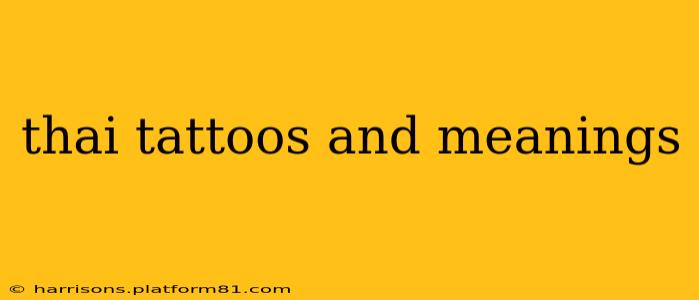Thai tattoos, often imbued with deep spiritual and cultural significance, are more than just body art; they are powerful expressions of faith, protection, and personal identity. This intricate art form, steeped in centuries of tradition, offers a fascinating glimpse into Thai Buddhism and folklore. Understanding the meaning behind these designs is crucial for anyone considering getting a Thai tattoo, ensuring a respectful and meaningful addition to their personal narrative.
What are the most common symbols used in Thai tattoos?
Many common symbols in Thai tattoos are drawn from Buddhist iconography, featuring deities, mythical creatures, and protective amulets. Some of the most frequently seen include:
- Buddha images: Representations of the Buddha, or specific aspects of his life, are extremely popular. These can range from realistic portraits to stylized depictions, each carrying its own unique meaning.
- Yantra: These geometric designs are sacred symbols believed to provide protection, good luck, and spiritual strength. Each yantra has a specific purpose and meaning, carefully chosen to match the wearer's intentions.
- Sak Yant: This term specifically refers to the traditional Thai tattooing technique, often involving the chanting of sacred mantras during the process, further imbuing the tattoo with spiritual power.
- Mythical creatures: Creatures like the Naga (a multi-headed serpent), Hanuman (the monkey god), and Garuda (a mythical bird) frequently appear, each representing different attributes and powers.
- Phra Phrom (Brahma): The creator god in the Hindu pantheon, often revered in Thailand, symbolizes creation, prosperity, and good fortune.
- Floral motifs: Flowers like the lotus, representing purity and enlightenment, are also common additions, often incorporated into larger designs.
What do Thai tattoos symbolize?
The symbolism within Thai tattoos is complex and multifaceted, often combining several layers of meaning. Generally, these tattoos are intended to:
- Provide protection: Many designs are believed to ward off evil spirits, protect against harm, and bring good luck.
- Enhance spiritual growth: Some tattoos are associated with specific Buddhist principles or deities, aiding in spiritual development and enlightenment.
- Grant strength and power: Certain mythical creatures and yantra designs are believed to bestow strength, courage, and invincibility.
- Reflect personal identity: The choice of design and its placement on the body are deeply personal, reflecting the wearer's beliefs, values, and aspirations.
Are Thai tattoos painful?
The pain associated with a Thai tattoo depends on several factors, including the size and location of the tattoo, the individual's pain tolerance, and the tattoo artist's technique. Sak Yant tattoos, traditionally applied with a sharpened bamboo stick or metal rod, are known to be more painful than modern tattooing methods. However, the perceived pain is often viewed as a necessary part of the ritual and a testament to the wearer's commitment to the tattoo's meaning.
How long does it take to get a Thai tattoo?
The time required to complete a Thai tattoo varies greatly, depending on the complexity and size of the design. Simple designs may take only a few hours, while intricate yantra or large-scale pieces can take multiple sessions, spanning several days or even weeks. The traditional Sak Yant method, typically done using a hand-tapped needle, is generally slower than modern machine tattooing.
What is the cultural significance of Thai tattoos?
Thai tattoos are deeply rooted in Thai culture and spirituality. They are often seen as a sacred act, connecting the wearer to ancient traditions and beliefs. The process itself, especially with the traditional Sak Yant method, is often accompanied by rituals and chanting, reinforcing the tattoo's spiritual significance. These tattoos aren't just decorative; they are powerful symbols of faith, protection, and personal identity, representing a profound connection to Thai culture and history.
Where can I find a reputable artist for a Thai tattoo?
Finding a reputable artist specializing in Thai tattoos requires careful research. Look for artists with demonstrable experience in traditional techniques and a deep understanding of the cultural significance of their work. Reviews from other clients, photos of their work, and testimonials can be invaluable in assessing an artist's skill and professionalism. Remember to respect the culture and tradition involved; choose an artist who approaches this art form with reverence and authenticity.
This comprehensive guide offers a starting point for understanding the rich world of Thai tattoos. Remember to always conduct thorough research and choose an artist who respects the tradition and cultural significance of these powerful symbols. The right tattoo can be a lifelong expression of your beliefs and values—a testament to your journey and connection to this fascinating art form.
